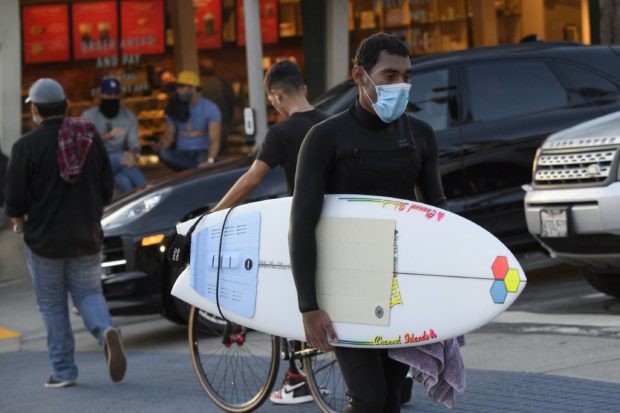
According to a recent survey, Americans appear to have decided that mask-wearing is here to stay in public places, even when the pandemic is a distant memory. Image: Patrick T. Fallon/AFP
The pandemic has shaken up many aspects of our day-to-day lives. From face masks to lockdowns to remote working, it sometimes feels like nothing will be as before. And while wearing a face mask currently still feels onerous and restrictive, many people could be ready to adopt them for good. According to a recent survey, Americans appear to have decided that mask-wearing is here to stay in public places, even when the pandemic is a distant memory.
Face masks were already commonplace in many Asian countries well before the Covid-19 pandemic, protecting people from illnesses, allergies or pollution. This cultural singularity, which seemed a world away from the norms in Western countries, helped boost responsiveness with widespread mask-wearing when the global health crisis began one year ago.
But this cultural exception may soon no longer be one at all. In fact, despite the constraints of wearing a face covering over mouth and nose all day long, many people could now be ready to adopt face masks long-term. Admittedly, the absence — or near absence — of winter epidemics like flu and gastroenteritis in many countries worldwide, may contribute to the appeal.
A new survey of over 2,000 Americans by Ohio State University Wexner Medical Center reveals a certain desire to continue some current health precautions in the name of public health, even once the pandemic is over. Almost three-quarters of Americans polled (72%) said that they plan to continue to wear masks in public, and 80% will still avoid crowds.
Could impeccable hygiene be the new normal?
“While the progress we’re making toward recovery is exciting, it’s critical that we don’t ease up on the precautions that we know have worked thus far,” said Dr. Iahn Gonsenhauser, chief quality and patient safety officer at The Ohio State Wexner Medical Center. “Masks and physical distancing are still our best weapons for limiting spread and, now that we have a vaccine, will make those precautions even more effective and will drive new cases way down if we stay the course.”
Another, not insignificant finding is that 90% of people polled plan to keep up frequent handwashing and sanitizer use after Covid-19 — gestures which, if ongoing, could have an impact on several seasonal epidemics.
“Flu cases and hospitalizations are way down compared to recent years. A lot of that is likely because precautions like masking, physical distancing and hand hygiene are working to prevent the flu,” Gonsenhauser said. “I think a lot of people realize what we’ve learned from Covid-19 can be applied more generally to keep our population healthy.”
It now remains to be seen whether mask wearers will be breathing a sign of relief — without their masks — once the pandemic is over. Irrespective, the pandemic will still have shaken up many of our norms in some way or other, from the widespread uptake of home working to online medical appointments and a conscious desire to protect our health, as well as that of others. NVG
RELATED STORIES:
Smart connected bandages developed to accelerate skin healing
What’s the best type of mask for COVID-19 protection? Scientists investigate